BMP4002: Legal System for Business Law - Business Management
VerifiedAdded on 2023/06/18
|9
|2634
|150
Report
AI Summary
This report provides an overview of the legal system for business in the UK, focusing on key classifications of law such as civil and criminal law, and explaining the roles of the High Court and Supreme Court. It delves into the sources of law, including case law and legislation, with a detailed explanation of delegated legislation. The report also examines the UK law-making process, specifically in the context of employment law, outlining statutory duties of employers towards their employees and addressing wrongful and unfair dismissal actions. This document serves as a comprehensive guide to understanding the legal framework governing businesses in the UK.
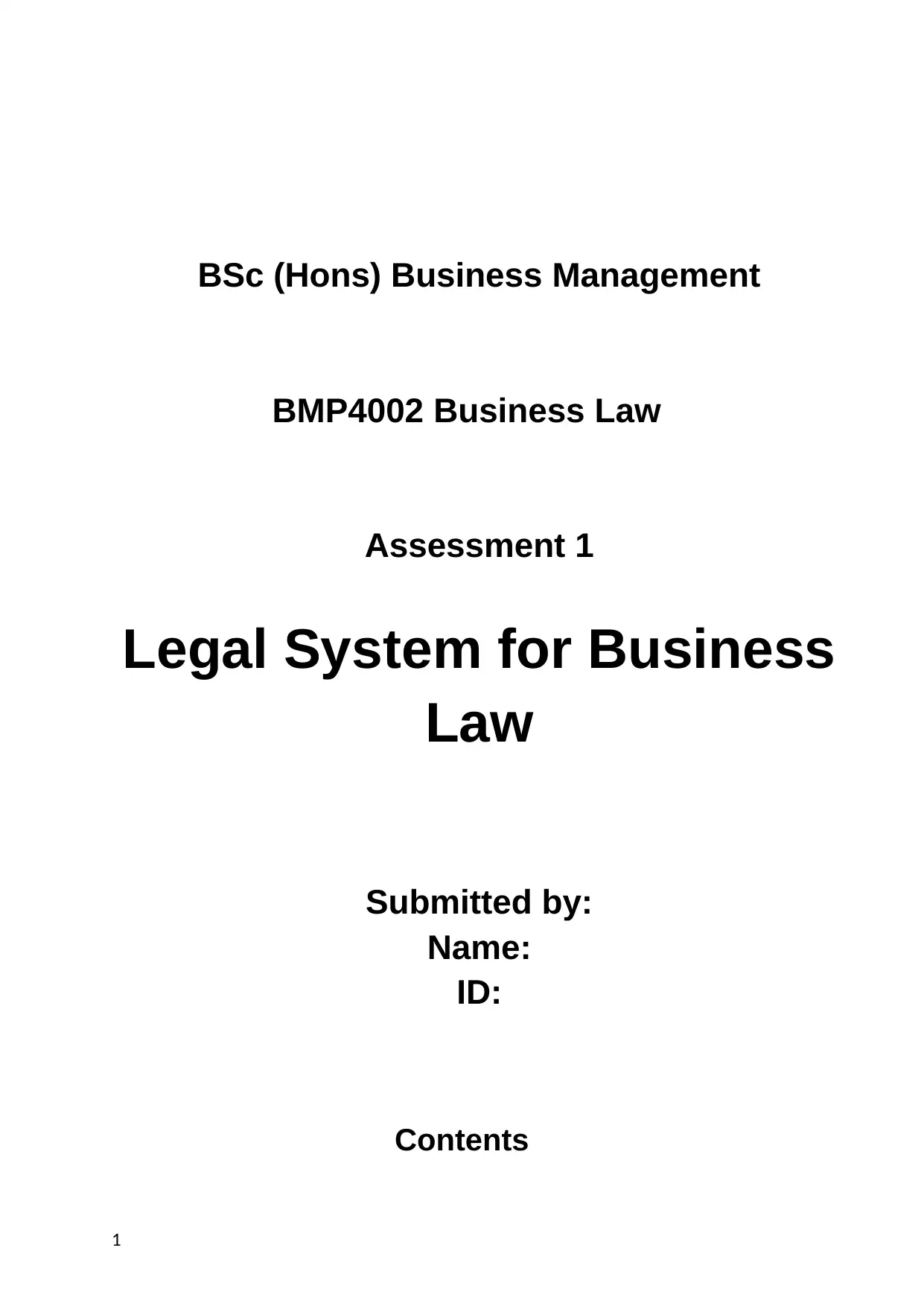
BSc (Hons) Business Management
BMP4002 Business Law
Assessment 1
Legal System for Business
Law
Submitted by:
Name:
ID:
Contents
1
BMP4002 Business Law
Assessment 1
Legal System for Business
Law
Submitted by:
Name:
ID:
Contents
1
Paraphrase This Document
Need a fresh take? Get an instant paraphrase of this document with our AI Paraphraser
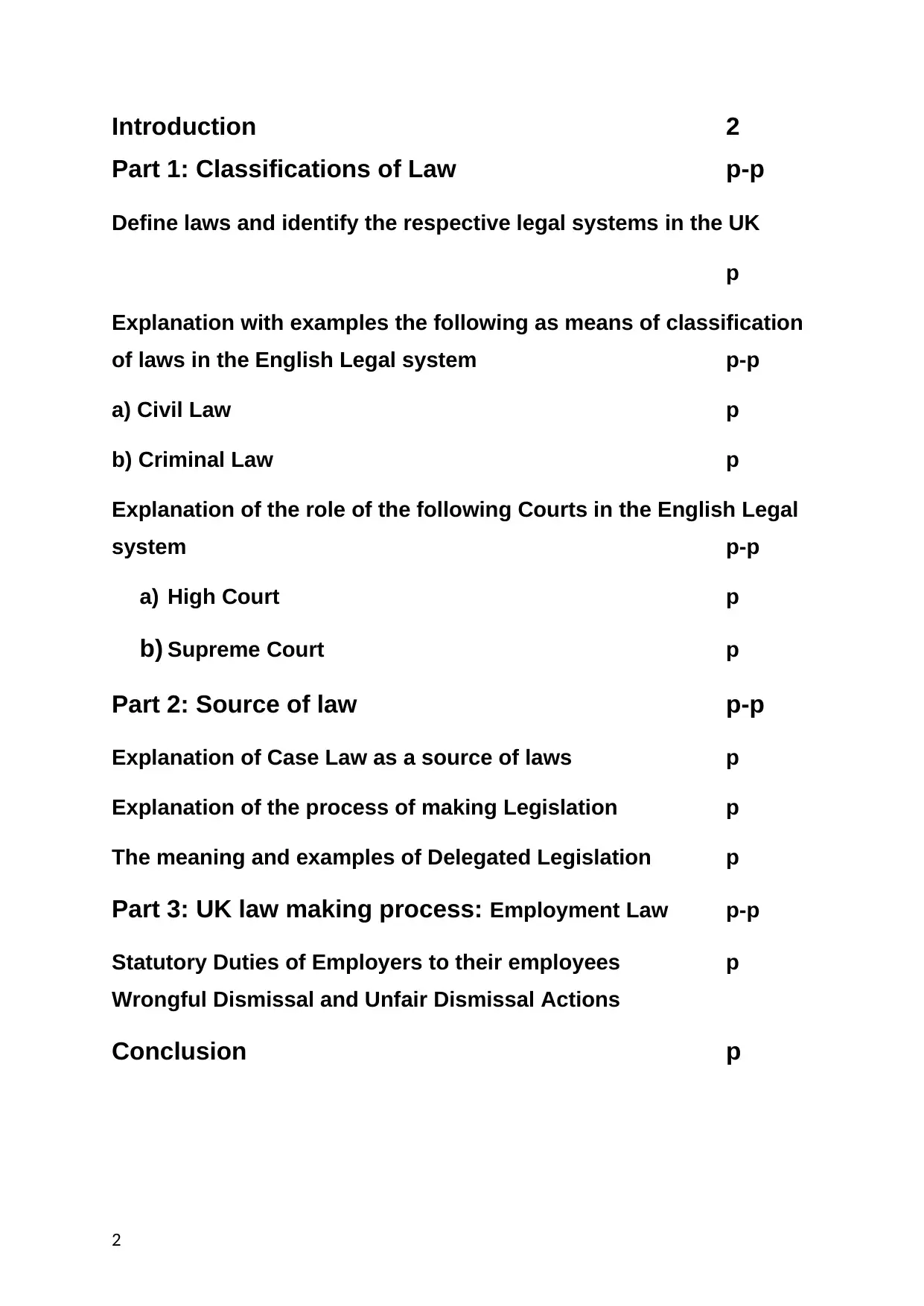
Introduction 2
Part 1: Classifications of Law p-p
Define laws and identify the respective legal systems in the UK
p
Explanation with examples the following as means of classification
of laws in the English Legal system p-p
a) Civil Law p
b) Criminal Law p
Explanation of the role of the following Courts in the English Legal
system p-p
a) High Court p
b) Supreme Court p
Part 2: Source of law p-p
Explanation of Case Law as a source of laws p
Explanation of the process of making Legislation p
The meaning and examples of Delegated Legislation p
Part 3: UK law making process: Employment Law p-p
Statutory Duties of Employers to their employees p
Wrongful Dismissal and Unfair Dismissal Actions
Conclusion p
2
Part 1: Classifications of Law p-p
Define laws and identify the respective legal systems in the UK
p
Explanation with examples the following as means of classification
of laws in the English Legal system p-p
a) Civil Law p
b) Criminal Law p
Explanation of the role of the following Courts in the English Legal
system p-p
a) High Court p
b) Supreme Court p
Part 2: Source of law p-p
Explanation of Case Law as a source of laws p
Explanation of the process of making Legislation p
The meaning and examples of Delegated Legislation p
Part 3: UK law making process: Employment Law p-p
Statutory Duties of Employers to their employees p
Wrongful Dismissal and Unfair Dismissal Actions
Conclusion p
2
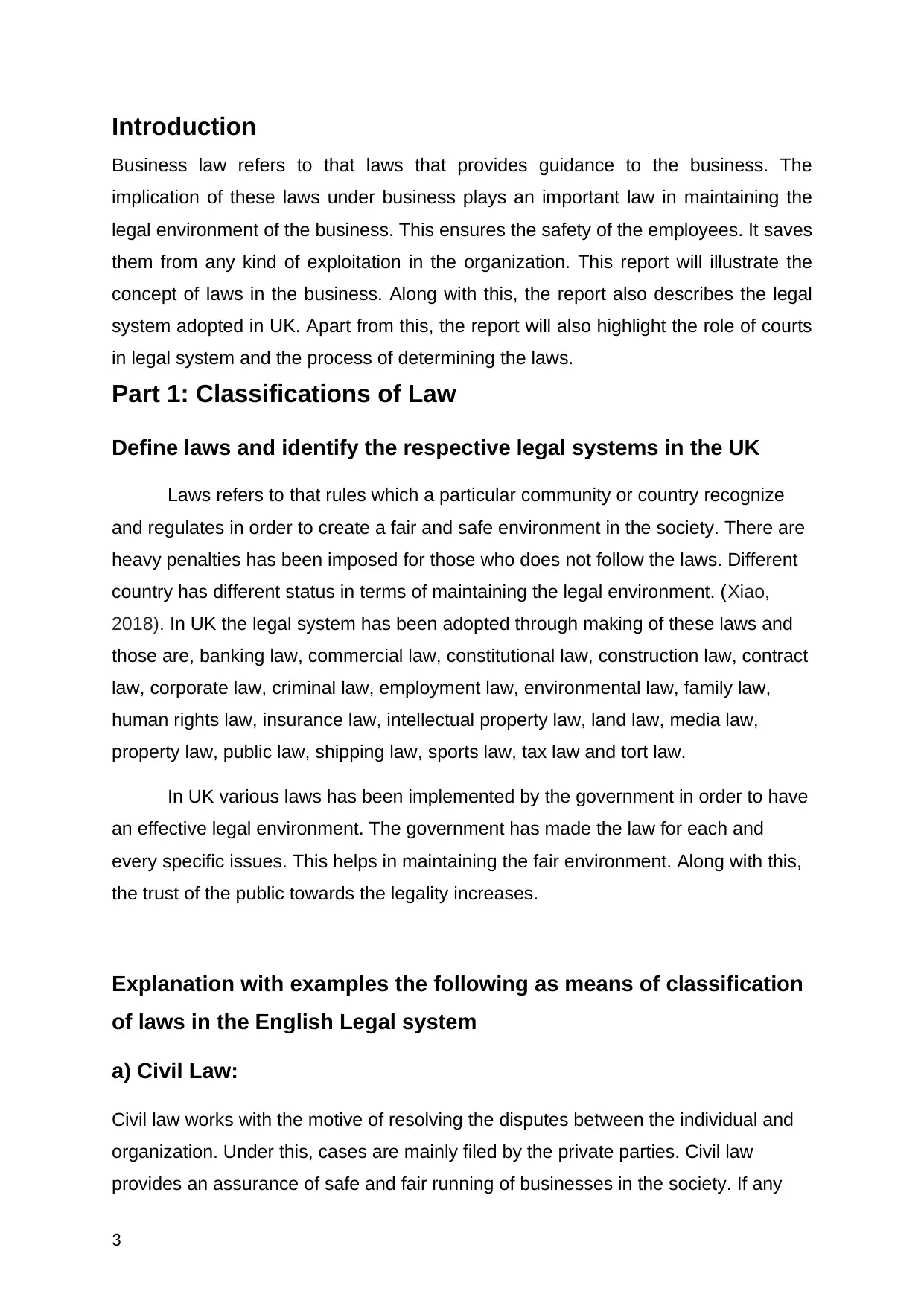
Introduction
Business law refers to that laws that provides guidance to the business. The
implication of these laws under business plays an important law in maintaining the
legal environment of the business. This ensures the safety of the employees. It saves
them from any kind of exploitation in the organization. This report will illustrate the
concept of laws in the business. Along with this, the report also describes the legal
system adopted in UK. Apart from this, the report will also highlight the role of courts
in legal system and the process of determining the laws.
Part 1: Classifications of Law
Define laws and identify the respective legal systems in the UK
Laws refers to that rules which a particular community or country recognize
and regulates in order to create a fair and safe environment in the society. There are
heavy penalties has been imposed for those who does not follow the laws. Different
country has different status in terms of maintaining the legal environment. (Xiao,
2018). In UK the legal system has been adopted through making of these laws and
those are, banking law, commercial law, constitutional law, construction law, contract
law, corporate law, criminal law, employment law, environmental law, family law,
human rights law, insurance law, intellectual property law, land law, media law,
property law, public law, shipping law, sports law, tax law and tort law.
In UK various laws has been implemented by the government in order to have
an effective legal environment. The government has made the law for each and
every specific issues. This helps in maintaining the fair environment. Along with this,
the trust of the public towards the legality increases.
Explanation with examples the following as means of classification
of laws in the English Legal system
a) Civil Law:
Civil law works with the motive of resolving the disputes between the individual and
organization. Under this, cases are mainly filed by the private parties. Civil law
provides an assurance of safe and fair running of businesses in the society. If any
3
Business law refers to that laws that provides guidance to the business. The
implication of these laws under business plays an important law in maintaining the
legal environment of the business. This ensures the safety of the employees. It saves
them from any kind of exploitation in the organization. This report will illustrate the
concept of laws in the business. Along with this, the report also describes the legal
system adopted in UK. Apart from this, the report will also highlight the role of courts
in legal system and the process of determining the laws.
Part 1: Classifications of Law
Define laws and identify the respective legal systems in the UK
Laws refers to that rules which a particular community or country recognize
and regulates in order to create a fair and safe environment in the society. There are
heavy penalties has been imposed for those who does not follow the laws. Different
country has different status in terms of maintaining the legal environment. (Xiao,
2018). In UK the legal system has been adopted through making of these laws and
those are, banking law, commercial law, constitutional law, construction law, contract
law, corporate law, criminal law, employment law, environmental law, family law,
human rights law, insurance law, intellectual property law, land law, media law,
property law, public law, shipping law, sports law, tax law and tort law.
In UK various laws has been implemented by the government in order to have
an effective legal environment. The government has made the law for each and
every specific issues. This helps in maintaining the fair environment. Along with this,
the trust of the public towards the legality increases.
Explanation with examples the following as means of classification
of laws in the English Legal system
a) Civil Law:
Civil law works with the motive of resolving the disputes between the individual and
organization. Under this, cases are mainly filed by the private parties. Civil law
provides an assurance of safe and fair running of businesses in the society. If any
3
⊘ This is a preview!⊘
Do you want full access?
Subscribe today to unlock all pages.

Trusted by 1+ million students worldwide
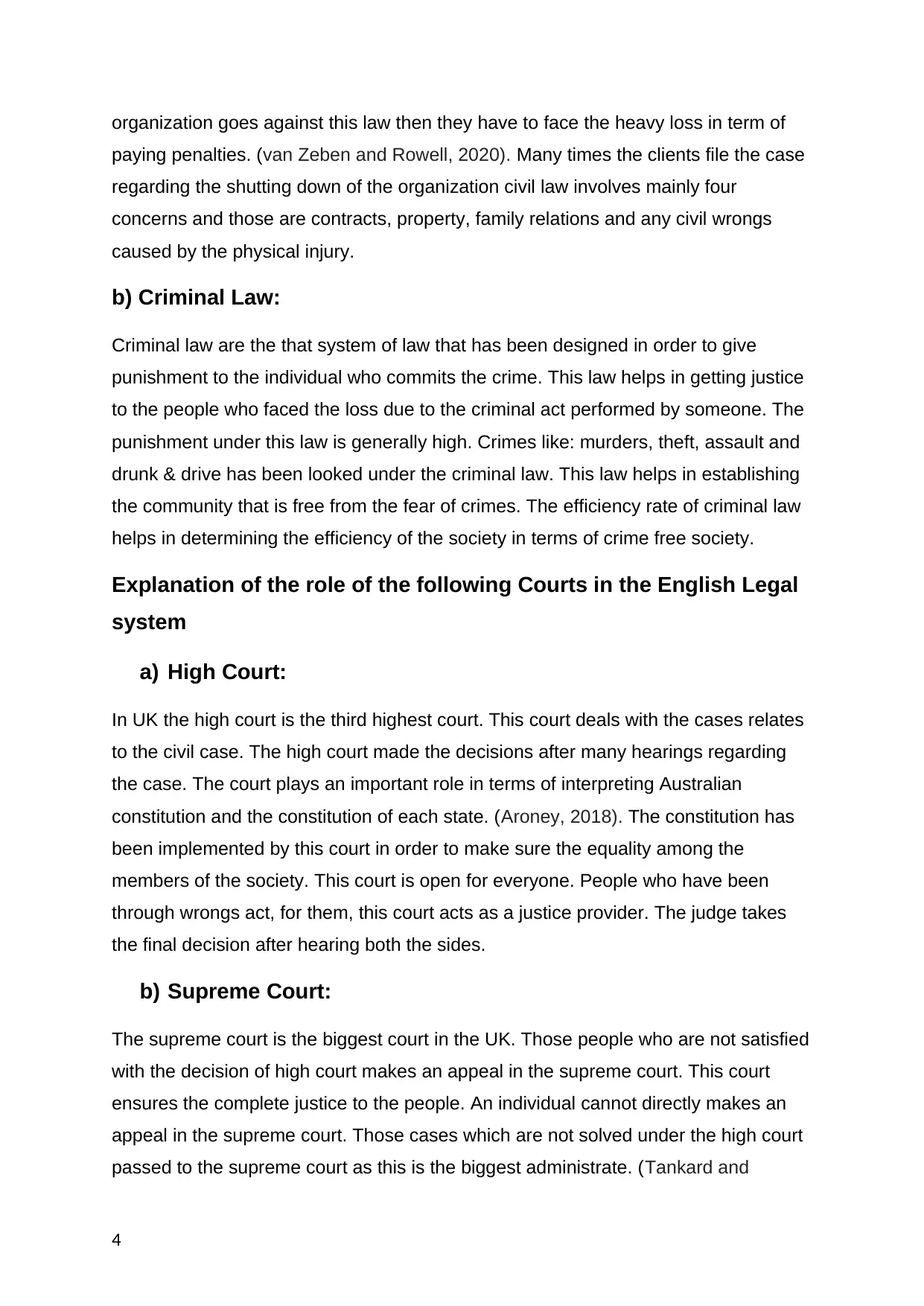
organization goes against this law then they have to face the heavy loss in term of
paying penalties. (van Zeben and Rowell, 2020). Many times the clients file the case
regarding the shutting down of the organization civil law involves mainly four
concerns and those are contracts, property, family relations and any civil wrongs
caused by the physical injury.
b) Criminal Law:
Criminal law are the that system of law that has been designed in order to give
punishment to the individual who commits the crime. This law helps in getting justice
to the people who faced the loss due to the criminal act performed by someone. The
punishment under this law is generally high. Crimes like: murders, theft, assault and
drunk & drive has been looked under the criminal law. This law helps in establishing
the community that is free from the fear of crimes. The efficiency rate of criminal law
helps in determining the efficiency of the society in terms of crime free society.
Explanation of the role of the following Courts in the English Legal
system
a) High Court:
In UK the high court is the third highest court. This court deals with the cases relates
to the civil case. The high court made the decisions after many hearings regarding
the case. The court plays an important role in terms of interpreting Australian
constitution and the constitution of each state. (Aroney, 2018). The constitution has
been implemented by this court in order to make sure the equality among the
members of the society. This court is open for everyone. People who have been
through wrongs act, for them, this court acts as a justice provider. The judge takes
the final decision after hearing both the sides.
b) Supreme Court:
The supreme court is the biggest court in the UK. Those people who are not satisfied
with the decision of high court makes an appeal in the supreme court. This court
ensures the complete justice to the people. An individual cannot directly makes an
appeal in the supreme court. Those cases which are not solved under the high court
passed to the supreme court as this is the biggest administrate. (Tankard and
4
paying penalties. (van Zeben and Rowell, 2020). Many times the clients file the case
regarding the shutting down of the organization civil law involves mainly four
concerns and those are contracts, property, family relations and any civil wrongs
caused by the physical injury.
b) Criminal Law:
Criminal law are the that system of law that has been designed in order to give
punishment to the individual who commits the crime. This law helps in getting justice
to the people who faced the loss due to the criminal act performed by someone. The
punishment under this law is generally high. Crimes like: murders, theft, assault and
drunk & drive has been looked under the criminal law. This law helps in establishing
the community that is free from the fear of crimes. The efficiency rate of criminal law
helps in determining the efficiency of the society in terms of crime free society.
Explanation of the role of the following Courts in the English Legal
system
a) High Court:
In UK the high court is the third highest court. This court deals with the cases relates
to the civil case. The high court made the decisions after many hearings regarding
the case. The court plays an important role in terms of interpreting Australian
constitution and the constitution of each state. (Aroney, 2018). The constitution has
been implemented by this court in order to make sure the equality among the
members of the society. This court is open for everyone. People who have been
through wrongs act, for them, this court acts as a justice provider. The judge takes
the final decision after hearing both the sides.
b) Supreme Court:
The supreme court is the biggest court in the UK. Those people who are not satisfied
with the decision of high court makes an appeal in the supreme court. This court
ensures the complete justice to the people. An individual cannot directly makes an
appeal in the supreme court. Those cases which are not solved under the high court
passed to the supreme court as this is the biggest administrate. (Tankard and
4
Paraphrase This Document
Need a fresh take? Get an instant paraphrase of this document with our AI Paraphraser
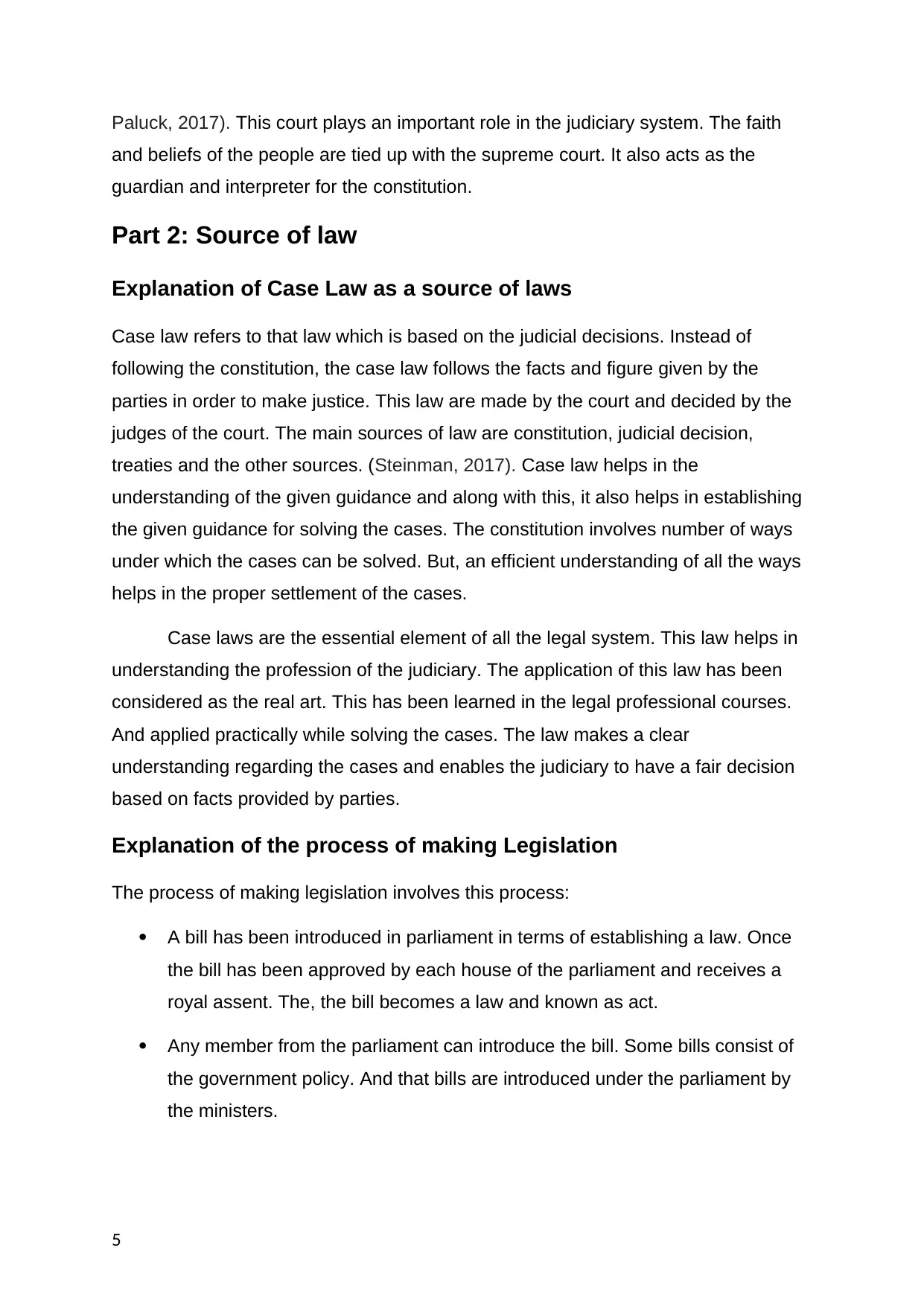
Paluck, 2017). This court plays an important role in the judiciary system. The faith
and beliefs of the people are tied up with the supreme court. It also acts as the
guardian and interpreter for the constitution.
Part 2: Source of law
Explanation of Case Law as a source of laws
Case law refers to that law which is based on the judicial decisions. Instead of
following the constitution, the case law follows the facts and figure given by the
parties in order to make justice. This law are made by the court and decided by the
judges of the court. The main sources of law are constitution, judicial decision,
treaties and the other sources. (Steinman, 2017). Case law helps in the
understanding of the given guidance and along with this, it also helps in establishing
the given guidance for solving the cases. The constitution involves number of ways
under which the cases can be solved. But, an efficient understanding of all the ways
helps in the proper settlement of the cases.
Case laws are the essential element of all the legal system. This law helps in
understanding the profession of the judiciary. The application of this law has been
considered as the real art. This has been learned in the legal professional courses.
And applied practically while solving the cases. The law makes a clear
understanding regarding the cases and enables the judiciary to have a fair decision
based on facts provided by parties.
Explanation of the process of making Legislation
The process of making legislation involves this process:
A bill has been introduced in parliament in terms of establishing a law. Once
the bill has been approved by each house of the parliament and receives a
royal assent. The, the bill becomes a law and known as act.
Any member from the parliament can introduce the bill. Some bills consist of
the government policy. And that bills are introduced under the parliament by
the ministers.
5
and beliefs of the people are tied up with the supreme court. It also acts as the
guardian and interpreter for the constitution.
Part 2: Source of law
Explanation of Case Law as a source of laws
Case law refers to that law which is based on the judicial decisions. Instead of
following the constitution, the case law follows the facts and figure given by the
parties in order to make justice. This law are made by the court and decided by the
judges of the court. The main sources of law are constitution, judicial decision,
treaties and the other sources. (Steinman, 2017). Case law helps in the
understanding of the given guidance and along with this, it also helps in establishing
the given guidance for solving the cases. The constitution involves number of ways
under which the cases can be solved. But, an efficient understanding of all the ways
helps in the proper settlement of the cases.
Case laws are the essential element of all the legal system. This law helps in
understanding the profession of the judiciary. The application of this law has been
considered as the real art. This has been learned in the legal professional courses.
And applied practically while solving the cases. The law makes a clear
understanding regarding the cases and enables the judiciary to have a fair decision
based on facts provided by parties.
Explanation of the process of making Legislation
The process of making legislation involves this process:
A bill has been introduced in parliament in terms of establishing a law. Once
the bill has been approved by each house of the parliament and receives a
royal assent. The, the bill becomes a law and known as act.
Any member from the parliament can introduce the bill. Some bills consist of
the government policy. And that bills are introduced under the parliament by
the ministers.
5
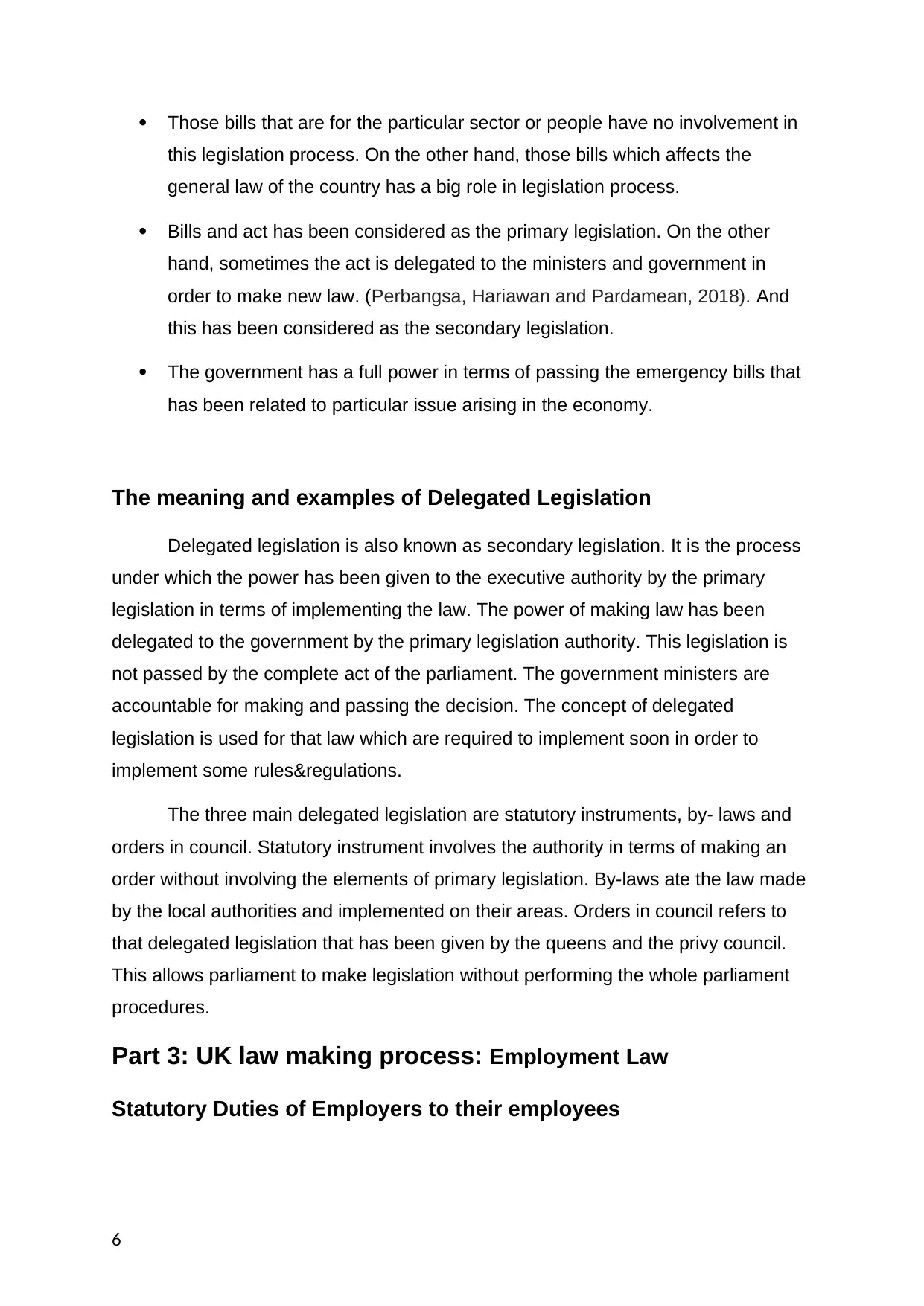
Those bills that are for the particular sector or people have no involvement in
this legislation process. On the other hand, those bills which affects the
general law of the country has a big role in legislation process.
Bills and act has been considered as the primary legislation. On the other
hand, sometimes the act is delegated to the ministers and government in
order to make new law. (Perbangsa, Hariawan and Pardamean, 2018). And
this has been considered as the secondary legislation.
The government has a full power in terms of passing the emergency bills that
has been related to particular issue arising in the economy.
The meaning and examples of Delegated Legislation
Delegated legislation is also known as secondary legislation. It is the process
under which the power has been given to the executive authority by the primary
legislation in terms of implementing the law. The power of making law has been
delegated to the government by the primary legislation authority. This legislation is
not passed by the complete act of the parliament. The government ministers are
accountable for making and passing the decision. The concept of delegated
legislation is used for that law which are required to implement soon in order to
implement some rules®ulations.
The three main delegated legislation are statutory instruments, by- laws and
orders in council. Statutory instrument involves the authority in terms of making an
order without involving the elements of primary legislation. By-laws ate the law made
by the local authorities and implemented on their areas. Orders in council refers to
that delegated legislation that has been given by the queens and the privy council.
This allows parliament to make legislation without performing the whole parliament
procedures.
Part 3: UK law making process: Employment Law
Statutory Duties of Employers to their employees
6
this legislation process. On the other hand, those bills which affects the
general law of the country has a big role in legislation process.
Bills and act has been considered as the primary legislation. On the other
hand, sometimes the act is delegated to the ministers and government in
order to make new law. (Perbangsa, Hariawan and Pardamean, 2018). And
this has been considered as the secondary legislation.
The government has a full power in terms of passing the emergency bills that
has been related to particular issue arising in the economy.
The meaning and examples of Delegated Legislation
Delegated legislation is also known as secondary legislation. It is the process
under which the power has been given to the executive authority by the primary
legislation in terms of implementing the law. The power of making law has been
delegated to the government by the primary legislation authority. This legislation is
not passed by the complete act of the parliament. The government ministers are
accountable for making and passing the decision. The concept of delegated
legislation is used for that law which are required to implement soon in order to
implement some rules®ulations.
The three main delegated legislation are statutory instruments, by- laws and
orders in council. Statutory instrument involves the authority in terms of making an
order without involving the elements of primary legislation. By-laws ate the law made
by the local authorities and implemented on their areas. Orders in council refers to
that delegated legislation that has been given by the queens and the privy council.
This allows parliament to make legislation without performing the whole parliament
procedures.
Part 3: UK law making process: Employment Law
Statutory Duties of Employers to their employees
6
⊘ This is a preview!⊘
Do you want full access?
Subscribe today to unlock all pages.

Trusted by 1+ million students worldwide
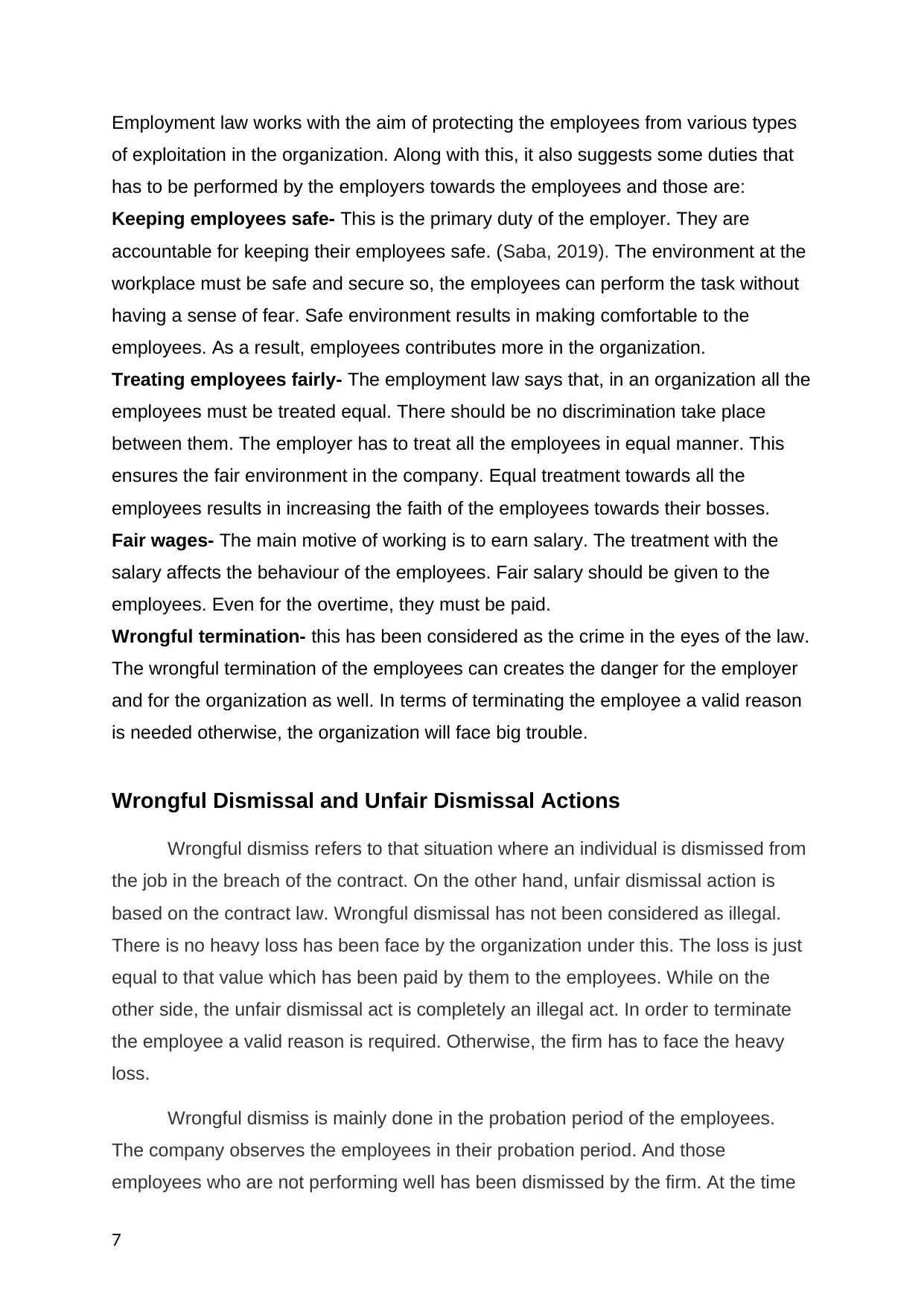
Employment law works with the aim of protecting the employees from various types
of exploitation in the organization. Along with this, it also suggests some duties that
has to be performed by the employers towards the employees and those are:
Keeping employees safe- This is the primary duty of the employer. They are
accountable for keeping their employees safe. (Saba, 2019). The environment at the
workplace must be safe and secure so, the employees can perform the task without
having a sense of fear. Safe environment results in making comfortable to the
employees. As a result, employees contributes more in the organization.
Treating employees fairly- The employment law says that, in an organization all the
employees must be treated equal. There should be no discrimination take place
between them. The employer has to treat all the employees in equal manner. This
ensures the fair environment in the company. Equal treatment towards all the
employees results in increasing the faith of the employees towards their bosses.
Fair wages- The main motive of working is to earn salary. The treatment with the
salary affects the behaviour of the employees. Fair salary should be given to the
employees. Even for the overtime, they must be paid.
Wrongful termination- this has been considered as the crime in the eyes of the law.
The wrongful termination of the employees can creates the danger for the employer
and for the organization as well. In terms of terminating the employee a valid reason
is needed otherwise, the organization will face big trouble.
Wrongful Dismissal and Unfair Dismissal Actions
Wrongful dismiss refers to that situation where an individual is dismissed from
the job in the breach of the contract. On the other hand, unfair dismissal action is
based on the contract law. Wrongful dismissal has not been considered as illegal.
There is no heavy loss has been face by the organization under this. The loss is just
equal to that value which has been paid by them to the employees. While on the
other side, the unfair dismissal act is completely an illegal act. In order to terminate
the employee a valid reason is required. Otherwise, the firm has to face the heavy
loss.
Wrongful dismiss is mainly done in the probation period of the employees.
The company observes the employees in their probation period. And those
employees who are not performing well has been dismissed by the firm. At the time
7
of exploitation in the organization. Along with this, it also suggests some duties that
has to be performed by the employers towards the employees and those are:
Keeping employees safe- This is the primary duty of the employer. They are
accountable for keeping their employees safe. (Saba, 2019). The environment at the
workplace must be safe and secure so, the employees can perform the task without
having a sense of fear. Safe environment results in making comfortable to the
employees. As a result, employees contributes more in the organization.
Treating employees fairly- The employment law says that, in an organization all the
employees must be treated equal. There should be no discrimination take place
between them. The employer has to treat all the employees in equal manner. This
ensures the fair environment in the company. Equal treatment towards all the
employees results in increasing the faith of the employees towards their bosses.
Fair wages- The main motive of working is to earn salary. The treatment with the
salary affects the behaviour of the employees. Fair salary should be given to the
employees. Even for the overtime, they must be paid.
Wrongful termination- this has been considered as the crime in the eyes of the law.
The wrongful termination of the employees can creates the danger for the employer
and for the organization as well. In terms of terminating the employee a valid reason
is needed otherwise, the organization will face big trouble.
Wrongful Dismissal and Unfair Dismissal Actions
Wrongful dismiss refers to that situation where an individual is dismissed from
the job in the breach of the contract. On the other hand, unfair dismissal action is
based on the contract law. Wrongful dismissal has not been considered as illegal.
There is no heavy loss has been face by the organization under this. The loss is just
equal to that value which has been paid by them to the employees. While on the
other side, the unfair dismissal act is completely an illegal act. In order to terminate
the employee a valid reason is required. Otherwise, the firm has to face the heavy
loss.
Wrongful dismiss is mainly done in the probation period of the employees.
The company observes the employees in their probation period. And those
employees who are not performing well has been dismissed by the firm. At the time
7
Paraphrase This Document
Need a fresh take? Get an instant paraphrase of this document with our AI Paraphraser
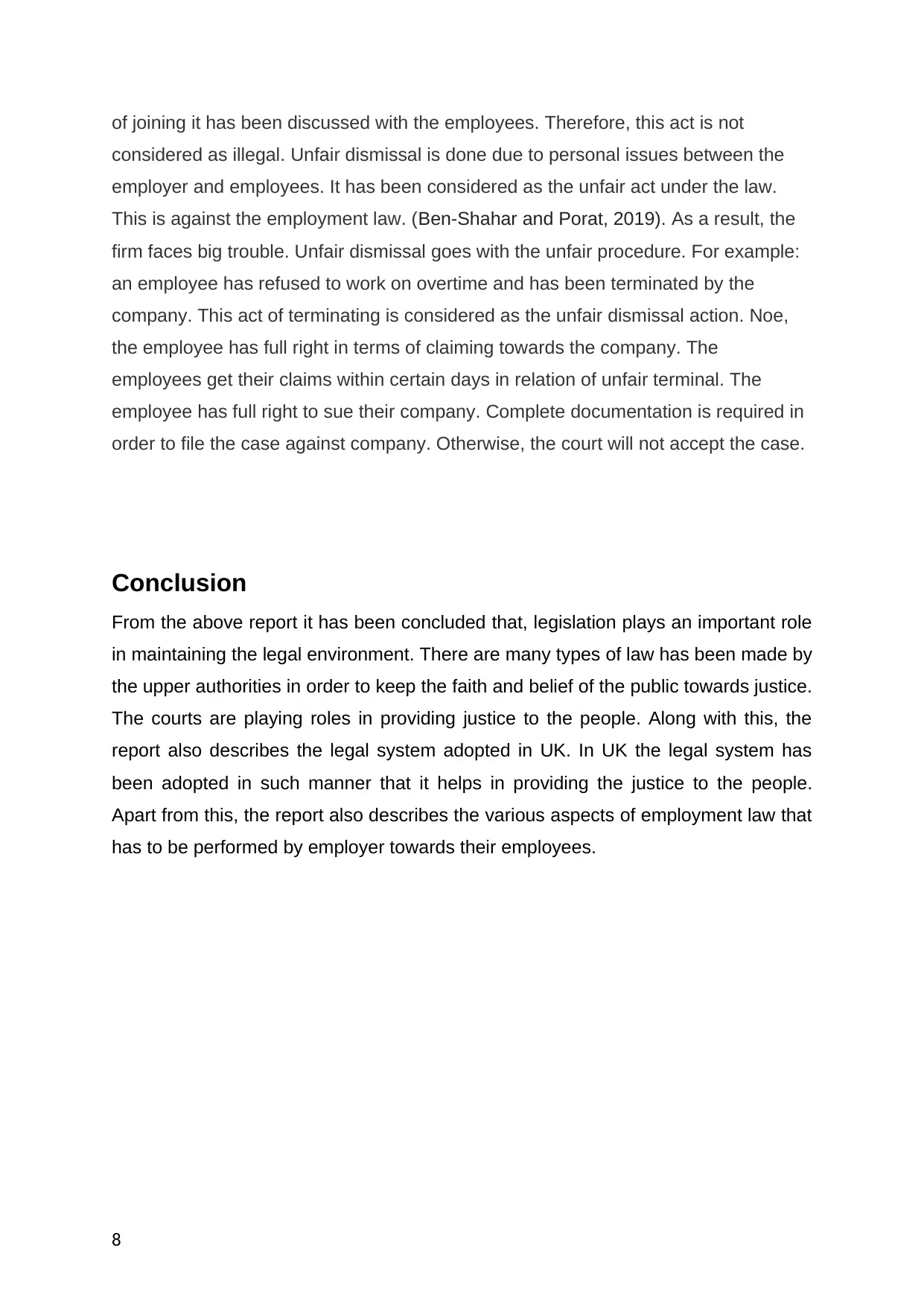
of joining it has been discussed with the employees. Therefore, this act is not
considered as illegal. Unfair dismissal is done due to personal issues between the
employer and employees. It has been considered as the unfair act under the law.
This is against the employment law. (Ben-Shahar and Porat, 2019). As a result, the
firm faces big trouble. Unfair dismissal goes with the unfair procedure. For example:
an employee has refused to work on overtime and has been terminated by the
company. This act of terminating is considered as the unfair dismissal action. Noe,
the employee has full right in terms of claiming towards the company. The
employees get their claims within certain days in relation of unfair terminal. The
employee has full right to sue their company. Complete documentation is required in
order to file the case against company. Otherwise, the court will not accept the case.
Conclusion
From the above report it has been concluded that, legislation plays an important role
in maintaining the legal environment. There are many types of law has been made by
the upper authorities in order to keep the faith and belief of the public towards justice.
The courts are playing roles in providing justice to the people. Along with this, the
report also describes the legal system adopted in UK. In UK the legal system has
been adopted in such manner that it helps in providing the justice to the people.
Apart from this, the report also describes the various aspects of employment law that
has to be performed by employer towards their employees.
8
considered as illegal. Unfair dismissal is done due to personal issues between the
employer and employees. It has been considered as the unfair act under the law.
This is against the employment law. (Ben-Shahar and Porat, 2019). As a result, the
firm faces big trouble. Unfair dismissal goes with the unfair procedure. For example:
an employee has refused to work on overtime and has been terminated by the
company. This act of terminating is considered as the unfair dismissal action. Noe,
the employee has full right in terms of claiming towards the company. The
employees get their claims within certain days in relation of unfair terminal. The
employee has full right to sue their company. Complete documentation is required in
order to file the case against company. Otherwise, the court will not accept the case.
Conclusion
From the above report it has been concluded that, legislation plays an important role
in maintaining the legal environment. There are many types of law has been made by
the upper authorities in order to keep the faith and belief of the public towards justice.
The courts are playing roles in providing justice to the people. Along with this, the
report also describes the legal system adopted in UK. In UK the legal system has
been adopted in such manner that it helps in providing the justice to the people.
Apart from this, the report also describes the various aspects of employment law that
has to be performed by employer towards their employees.
8
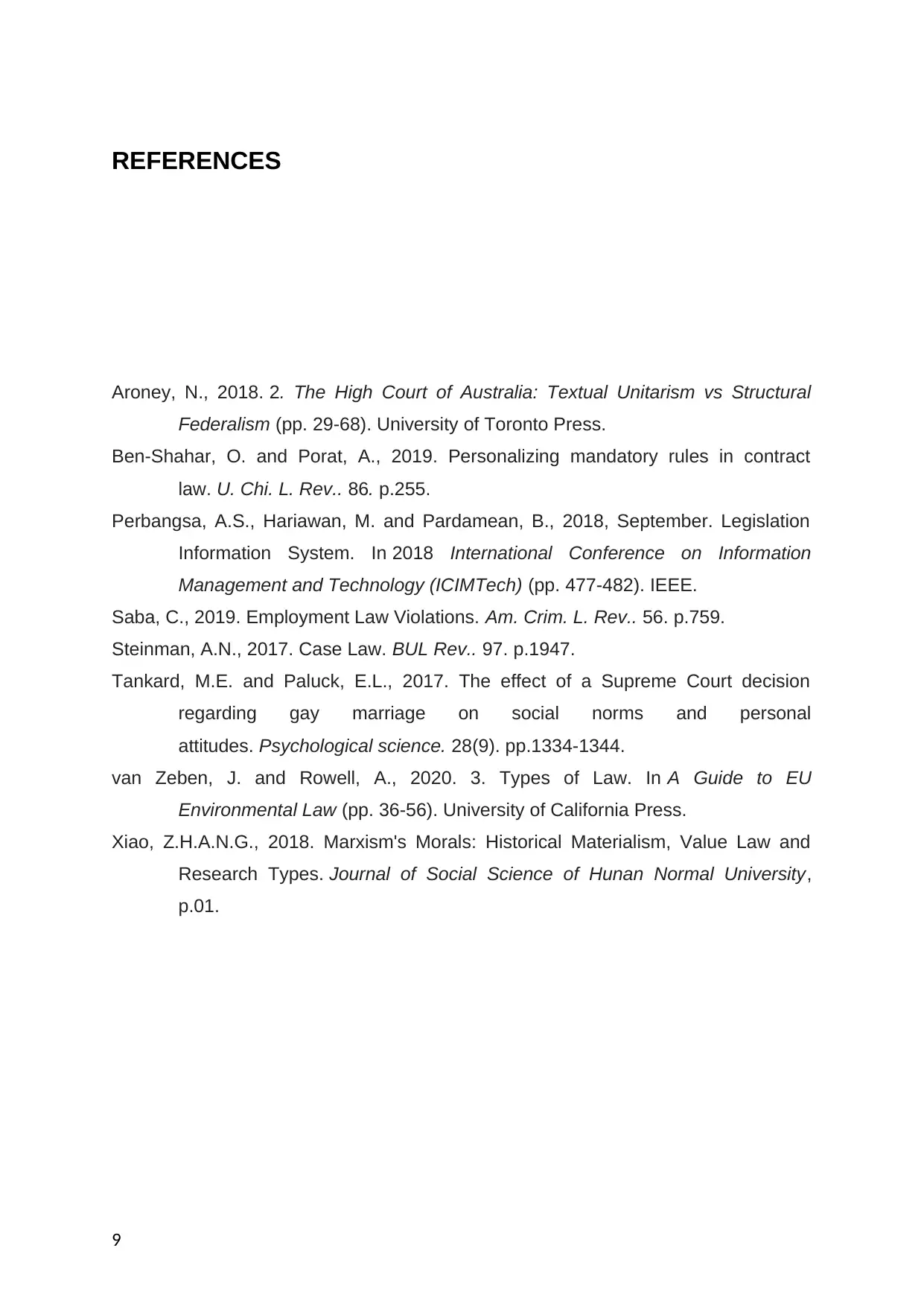
REFERENCES
Aroney, N., 2018. 2. The High Court of Australia: Textual Unitarism vs Structural
Federalism (pp. 29-68). University of Toronto Press.
Ben-Shahar, O. and Porat, A., 2019. Personalizing mandatory rules in contract
law. U. Chi. L. Rev.. 86. p.255.
Perbangsa, A.S., Hariawan, M. and Pardamean, B., 2018, September. Legislation
Information System. In 2018 International Conference on Information
Management and Technology (ICIMTech) (pp. 477-482). IEEE.
Saba, C., 2019. Employment Law Violations. Am. Crim. L. Rev.. 56. p.759.
Steinman, A.N., 2017. Case Law. BUL Rev.. 97. p.1947.
Tankard, M.E. and Paluck, E.L., 2017. The effect of a Supreme Court decision
regarding gay marriage on social norms and personal
attitudes. Psychological science. 28(9). pp.1334-1344.
van Zeben, J. and Rowell, A., 2020. 3. Types of Law. In A Guide to EU
Environmental Law (pp. 36-56). University of California Press.
Xiao, Z.H.A.N.G., 2018. Marxism's Morals: Historical Materialism, Value Law and
Research Types. Journal of Social Science of Hunan Normal University,
p.01.
9
Aroney, N., 2018. 2. The High Court of Australia: Textual Unitarism vs Structural
Federalism (pp. 29-68). University of Toronto Press.
Ben-Shahar, O. and Porat, A., 2019. Personalizing mandatory rules in contract
law. U. Chi. L. Rev.. 86. p.255.
Perbangsa, A.S., Hariawan, M. and Pardamean, B., 2018, September. Legislation
Information System. In 2018 International Conference on Information
Management and Technology (ICIMTech) (pp. 477-482). IEEE.
Saba, C., 2019. Employment Law Violations. Am. Crim. L. Rev.. 56. p.759.
Steinman, A.N., 2017. Case Law. BUL Rev.. 97. p.1947.
Tankard, M.E. and Paluck, E.L., 2017. The effect of a Supreme Court decision
regarding gay marriage on social norms and personal
attitudes. Psychological science. 28(9). pp.1334-1344.
van Zeben, J. and Rowell, A., 2020. 3. Types of Law. In A Guide to EU
Environmental Law (pp. 36-56). University of California Press.
Xiao, Z.H.A.N.G., 2018. Marxism's Morals: Historical Materialism, Value Law and
Research Types. Journal of Social Science of Hunan Normal University,
p.01.
9
⊘ This is a preview!⊘
Do you want full access?
Subscribe today to unlock all pages.

Trusted by 1+ million students worldwide
1 out of 9
Related Documents
Your All-in-One AI-Powered Toolkit for Academic Success.
+13062052269
info@desklib.com
Available 24*7 on WhatsApp / Email
![[object Object]](/_next/static/media/star-bottom.7253800d.svg)
Unlock your academic potential
Copyright © 2020–2025 A2Z Services. All Rights Reserved. Developed and managed by ZUCOL.

